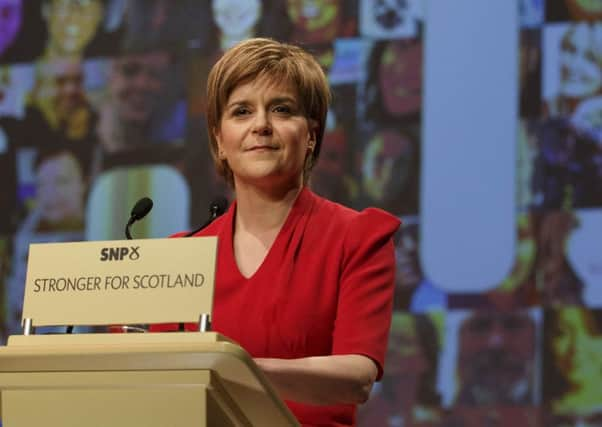Ewan Crawford: Healthy debate is key to our future


During my time working as a Scottish Government special adviser on the independence white paper it’s fair to say my colleagues would not have given me the prize for “world’s greatest optimist”.
Perhaps because I was closer than most to the polling figures in the dog days of 2013 (not spectacularly good) I didn’t always have the sunniest of dispositions as I walked through the grand, glass doors of St Andrew’s House.
Advertisement
Hide AdAdvertisement
Hide AdBut more than the immediate challenges of the then impending referendum I think what marked me out from some of my other colleagues was that I had worked in the SNP leader’s office in more difficult times.
The first few years of the Scottish Parliament were not the happiest for the party. In particular what was then, by far, the biggest cohort of SNP parliamentarians did not always operate as a disciplined unitary force.
Some Sundays it seemed better to stay under the duvet than flick through the Sunday papers with the dreaded “non-attributable briefings” providing the basis for various stories reporting internal attacks on the leadership.
Since those years the SNP has transformed itself into a dominant, serious party of government.
In recent days some opposition commentary, prompted by the vote on whether to launch airstrikes in Syria, has betrayed an angry bewilderment at the SNP’s unity of purpose.
According to Labour in particular it seems to be bad form to present a common position to the electorate and sound as if you really mean it.
Like so much of Labour’s view of its traditional opponent, there is almost a comical misunderstanding of the way the SNP operates.
It is not a party subject to a ferocious whipping operation. Indeed for much of the time at Holyrood responsibility for discipline has rested with Bruce Crawford, an MSP so courteous and reasonable he’s in danger of giving politicians a good name.
Advertisement
Hide AdAdvertisement
Hide AdOn issues such as military action in Syria, no whipping would be required anyway. I’ve not yet met anyone in the party who believes the case has been made.
For other questions, such as Nato membership, the SNP has shown itself to be unafraid of having a full-scale, open debate in the glare of a national conference. But crucially once a decision has been made, there is general acceptance of the need to accept party policy.
This, I suspect, is because for most in the SNP the lesson was learned long ago that voters tend not to reward division and in-fighting.
It might be nice to think that we live in what political scientists call a deliberative democracy in which opposing arguments are all given equal prominence and are heard respectfully in order that the best solutions can be teased out, so that parties can be commended for changing their minds rather than accused of performing “humiliating U-turns”.
But we don’t. And with the rise of the bear pit of social media, such an ideal seems further away than ever.
Indeed it is surely not unreasonable for people to expect parties to offer a coherent, agreed programme of government at election time rather than a shrug of the shoulders and a promise to debate. It is this sense of unified purpose, allied to a real sense of possibility, which has been responsible for much of the SNP’s recent success.
If anyone is any doubt about the risk of division, Labour is now offering itself as a gigantic warning sign. This is a party in a state of self-indulgent collapse.
It’s true that the confidential, off-the-record briefings against the leadership that I was concerned about in the SNP over a decade ago, no longer also afflict Labour. But that’s because they’ve been replaced by something much worse: open, public scorn and contempt for Jeremy Corbyn from his own frontbench.
Advertisement
Hide AdAdvertisement
Hide AdNone of this comes across as healthy, inclusive debate but as an ugly internal squabble which relegates voters to uninterested bystanders at best.
The self-immolation of Labour, means, however, more than ever there is a need for competing ideas to be given an airing in Scotland.
The No vote in the referendum has not meant the need to tackle the really big issues facing the country have gone away. The consequences of an ageing population, the need to improve productivity, a new industrial strategy, and most importantly issues around job creation and job security are, of course, still with us.
That’s why I believe we need to encourage greater public, academic, think-tank and media involvement in these issues outside of the party political arena.
In Ireland, academic economists from various institutions have come together to produce an accessible blog designed to stimulate wider debate about that country’s future. Why not here?
One thing seems clear, the alternative to discussing these ideas widely across Scotland is grim.
The decline and fall of Labour means we are now facing many more years of a Conservative government consistently rejected by voters north of the Border.
That, in turn, means an emboldened Tory party and Treasury with a new found confidence to address what both institutions believe is the over-generous funding of Scottish public services (an attitude already alarmingly apparent in the negotiations over the Scotland Bill’s fiscal framework). It means an ever-more unbalanced economy centred on London and the consequent decline in economic opportunity here.
Advertisement
Hide AdAdvertisement
Hide AdI am certain that this will mean, in time, a second independence referendum. The key to a healthy debate in the run up to that referendum is surely an engaged population which has both generated and been subject to a range of arguments over a number of years. Political parties can’t be left to get on with this on their own.